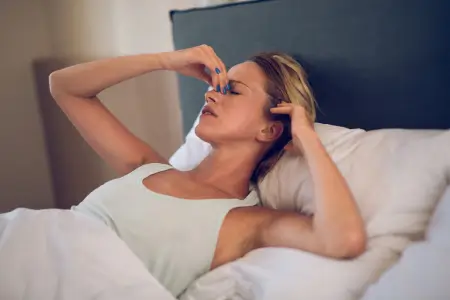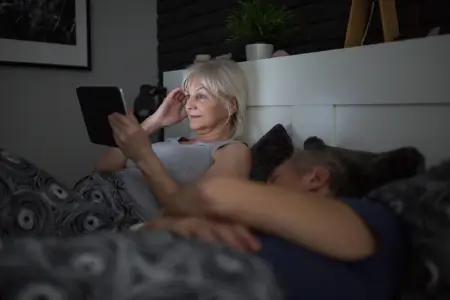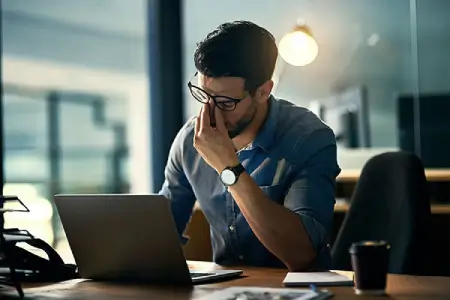Ever had those nights where the stars are shining bright, the world seems to be in deep slumber, but your brain decides it's the perfect time for an unscheduled party? You've tucked yourself in, all cosy under the blankets, ready to drift off into dreamland, but sleep seems to be playing a game of hide-and-seek with you?
Ah, welcome to the world of insomnia!
Now, a night or two of tossing and turning happens to the best of us. But when it becomes less of a once-in-a-blue-moon thing and more of a recurring theme in your nightly routine, that's when we start getting into the territory of insomnia. Picture it as a tricky riddle your brain throws your way, making it feel like your sleep cycle is doing the tango with wakefulness.
You might find yourself catching a few winks here and there, but it's never that deep, restful slumber you crave. Instead of a solid eight hours of shut-eye, you end up with a fragmented two-hour nap and a bleary-eyed morning staring at the alarm clock, wondering why it feels like you've been hit by a sleep-deprived freight train.
See, a night of sound sleep isn't just about catching some Zzz's; it's the secret ingredient for a vibrant day ahead and maintaining good health. But when insomnia decides to crash the sleep party, it's like someone flipped the script, leaving you feeling groggy, irritable, and, let's be honest, not your best self the next day.
Insomnia doesn't just mess with your nightly escapades; it can have some real consequences on your physical and mental well-being. From affecting your mood swings to being that sneaky culprit behind daytime fatigue and poor concentration, insomnia can be quite the party pooper in the game of life.
Moreover, persistent insomnia often intertwines with mental health challenges, such as fostering a breeding ground for overthinking, intensifying stress, and contributing to symptoms of depression. Its relentless grasp can exacerbate feelings of anxiety and deepen the struggles associated with maintaining a healthy mental state.
So, if you find yourself in a bit of a sleep struggle often, where counting sheep has become your late-night hobby, it might be time to chat with a sleep specialist. Because let's face it, a solid night of shut eye isn't a luxury; it's an essential part of a good and healthy life.

Insomnia is a type of sleep disorder, where persons find it difficult to fall asleep or stay asleep, even if they had the opportunity to have a good and relaxed sleep.

Sleep deprivation problems have been on the rise, lack of sleep is also affecting the daily routine of people and restricting their activities.

Sleep has its ways of effecting people. Here are a few types of insomnia, see where you land:

The sleep deprivation symptoms are quite reasonable to make a judgment that a person has insomnia. However, there are other ways to be sure about the problem.
Insomnia is a type of sleep disorder, where persons find it difficult to fall asleep or stay asleep, even if they had the opportunity to have a good and relaxed sleep. So if you
You could be suffering from insomnia!
It has become a common disorder owing to today’s lifestyle, but that is not the only reason you might have it.

Sleep deprivation problems have been on the rise. Lack of sleep is also affecting the daily routine of people and restricting their activities. The reason for such lost sleep can be because of three main issues:
1. Lifestyle
Lifestyle issues have grown to be the cause of many disorders. Sleep deprivation problems also surface because of lifestyle conduct like lack of physical activities, dietary choices, irregular bed-time habits, increased screen time, travel and jet lag, increased caffeine intake, and even street drugs.
2. Medical
Some people develop insomnia, while some may find a lack of sleep a part of their current medical conditions. It is true that pre-existing medical issues can be the reason for trouble in sleeping. Chronic body pains, gastroesophageal reflux, lung problems, heart disease, and even sleep apnea can cause insomnia.
3. Psychological
Growing psychological problems, especially in the millennials and Gen Z, seem to be a sign of worry. They can’t sleep for long hours, or sometimes throughout the night. Depression, anxiety, and stress are taking a toll on their mental health and even affect their sleep.
Apart from this, the growing trend of sleeping less, binge-watching throughout the night, completely disturbs the sleep cycle. People complain of not getting enough sleep or no sleep at all because the pattern has been destroyed!

Sleep has its ways of effecting people. Here are a few types of insomnia, see where you land:
1. Acute Insomnia
The problem of not getting enough sleep lasts for a few weeks or at most for a month. The sleeplessness is temporary, mainly caused by life events or certain activities, and is resolved without any treatment.
2. Chronic Insomnia
Sleepless for three nights in a week, and for 3 months? Insomnia problem could be a cause of worry as it is at a severe stage and needs attention. It could be both primary or comorbid insomnia.
3. Primary Insomnia
Primary insomnia develops over time and has no linkage to any pre-existing medical conditions. It is possible to have sleeplessness due to other reasons, part from the existing medical issues.
4. Comorbid or Secondary Insomnia
Here, the issue of trouble sleeping pops-up because of some health problem a person might already be suffering from. Sometimes, the medical issues or the medications associated with the same, cause sleep deprivation.

The sleep deprivation symptoms are quite reasonable to make a judgment that a person has insomnia. However, there are other ways to be sure about the problem.
A sleep study helps you find out the risk levels associated with your disorder. Also, you can maintain a sleep journal for a few weeks for your doctor to understand your sleep history for proper treatment.

There are various insomnia treatments available, depending upon the severity of the problem. While acute insomnia can be treated by following sleep hygiene methods and certain therapies; chronic insomnia might need cognitive therapies and medical assistance.
Although it is not a preferred insomnia cure, it is still an option. Visit a doctor with your sleep history and discuss your sleep cycle, for a prescribed medicinal course.
These are some techniques that a person must follow for a night of healthy sleep. It's the mantra for a good nap, for you to rise and shine! The bedroom rules are as follows:
Popularly known as CBTI, this therapy is a drug-free insomnia treatment. It is found to be the go-to therapy to cure sleeplessness. There are a couple of therapies under CBT that are effective in curing sleeplessness.
Sleeplessness is a disorder that is taken lightly and ignored most of the time. In this binge-watching culture, it has become a trend to not have a fixed sleep cycle. However, the problems associated with insomnia are much larger. Some of the grave consequences of not having a goodnight sleep can be
a. All-time fatigue and irritation
b. Decreased performance and lethargy
c. Grumpy mood and low energy
d. Day time sleepiness
e. Developing health problems like:
1. Obesity
2. Diabetes
3. Heart problems
4. Stress and anxiety
5. Blood pressure
6. Weak immune system and increased sensitivity
The risks are very high for such a problem and a light approach to it could lead to critical issues. Unable to sleep at night, could become a pattern and these difficulties might start to bubble. Starting with basic insomnia remedies can make a huge difference and help curb the problem before it becomes severe.
Rumour has it that there are ample misconceptions about insomnia. It’s time to clear the air and get the facts right!
Myth#1 You can make up for lost sleep
It seems like a plan for a lot of people to cover up their sleep during the weekends. However, it is no office work. Your body needs proper rest and sleep every night for you to function better and to stay healthy.
Myth#2 Sleep problems go away on their own
While, we wish all problems would just vanish, but sleep problems are just like other disorders. For you to have a nice sleep, it requires time and dedication. Sleep hygiene techniques and remedies are the solution to your problem, and not procrastination.
Myth#3 Waking up at night is no big deal
Having a disturbed sleep is as bad as having no sleep. If you wake up often in your sleep, you are still going to feel annoyed and irritated in the morning. In order to wake up fresh and energetic continuous sleep is crucial.
Myth#4 Only people with medical conditions have insomnia
While people with medical issues have chances of having insomnia, so as the rest of the crowd. Any lifestyle change, psychological problem can lead to insomnia. Sometimes, it is the primary problem that causes other health issues.
Myth#5 Supplements help me sleep
Be it caffeine, alcohol, or nicotine, which you think helps you relax, actually just make the sleep go away. Avoid it before bedtime, it will just ruin your sleep.
Myth#6 If I’m sleeping less I have insomnia
Sleeplessness is just one of the symptoms of insomnia. Hence it is not enough to declare that a person is suffering from it. Other symptoms include:
Myth#7 Counting sheep will help me sleep
There are some old school techniques that act as sleep hacks but aren’t always successful. If you are lying awake in the bed for more than 20mins, it is time to leave the warmth. Your bed needs to be the place for sleep and not to stay awake!
You have the facts correct now, make an informed decision. It’s a hidden dream to be healthy and fit, you know what to do!
Insomnia is prevalent in certain groups and is a cause of worry for them. Some people are more prone to insomnia than others.
The problem of sleep deprivation is more prevalent in women than in men
Elderly and the old are at a greater risk. Aging can affect their sleep, so does their medical problems.
People with pre-existing issues like depression and anxiety could have greater chances at having insomnia
People working in shifts are at a greater risk of having insomnia, as their sleep cycle is completely destroyed.
While a lot of us do face the problem of sleeplessness, there are certain sleep hacks to fall for your pillow
Stay updated on the latest developments, products,and servies.
Thanks for submitting the form.